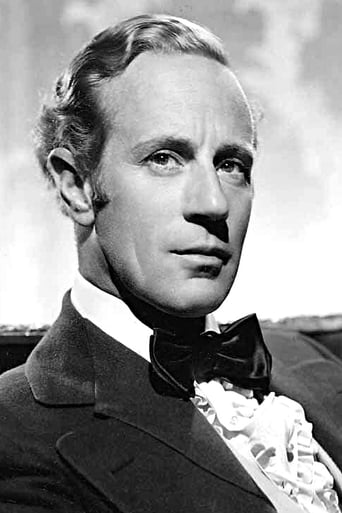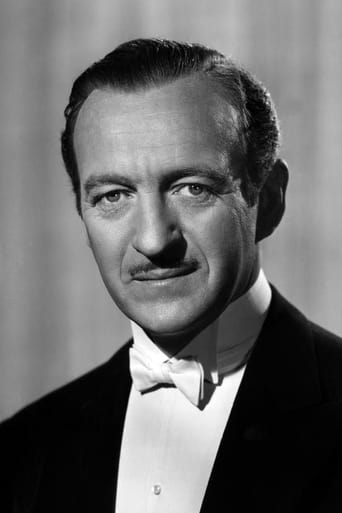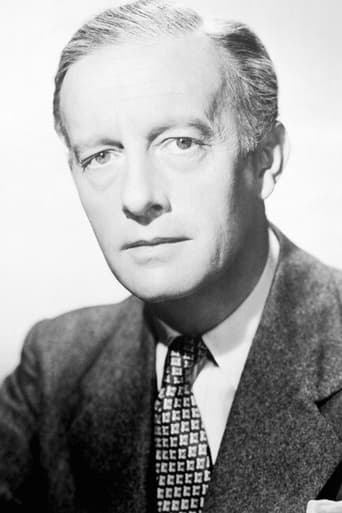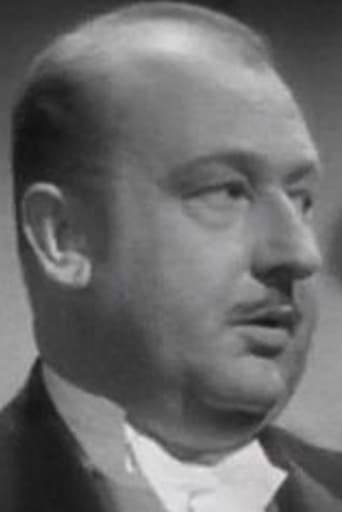Leofwine_draca
THE FIRST OF THE FEW is a mildly interesting WW2 film released when the war was in full swing. That makes it a propaganda piece and, it has to be said, a rather dated one at that. The film is about the guy who invented the Spitfire and shows the political background to the build up of war, with lots of interesting historical characters thrown into the mix.Watching it today, the production has invariably dated and feels slow and rather staged. Leslie Howard and David Niven are both effective in the leading roles but the rest of the cast don't really make much of an impact and the running time is a bit long to sustain full interest. There are some good scenes here but too much talk along the way which slows everything down quite considerably.
blanche-2
Leslie Howard's last film was one that he starred in, produced, and directed, in England called The First of the Few; in the U.S. called Spitfire. The British title relates to Winston Churchill's words: "Never in the field of human conflict was so much owed by so many to so few."It is the story of R.J. Mitchell, who designed the Spitfire, a plane which helped win the Battle of Britain.The Spitfire had several advantages. It was difficult to shoot down since the planes flew higher and faster than what the Germans had. Also, it was easy for the Spitfire to refuel since they were on home ground, whereas the Germans had to return to Germany to refuel. In part, it was designed by Mitchell due to his concern that the British military could not stand up to the German military. Mitchell's brilliance was in combining elements that had been invented earlier to make one fabulous plane. He had some false starts, but he ultimately succeeded. In 1931, his design, S.6B, won the Scheider Trophy Competition and started things off. The plane later broke the world speed record.We don't learn too much about Mitchell himself. He was dedicated to his work to the point of exhaustion, so it's doubtful he had a hot social life. Unlike Howard's upper class, even-tempered Mitchell, the real Mitchell was athletic, lower class, and easily angered. Howard made his acting choices deliberately as Mitchell's family spent a lot of time on the set.Howard costars with David Niven as his pilot, who provided some lighter moments. And if you like that sort of thing, there is a lot of aerial footage.Mitchell died of rectal cancer in 1937 at the age of 42, so he didn't see all of his plane's success. Howard died in 1943 on KLM Royal Dutch Airlines/BOAC Flight 777, which was shot down over the Bay of Biscay by the Luftwaffe as the plane flew from Lisbon to the UK. He was 50.This is a strong propaganda film, well acted and well directed. It was filmed at an active fighter station, Ibsley, and the extras were real Battle of Britain fliers, and the film also showed the real people working on the plane.Anyone interested in Mitchell, his son wrote two books: R.J. Mitchell: World Famous Aircraft Designer, and R.J.Mitchell: Schooldays to Spitfire.As an aside, because this was a propaganda film, Niven was released from his MGM contract in exchange for distribution rights. When Samuel Goldwyn saw the film, he realized Niven was in a supporting role and re-edited the movie, cutting 40 minutes.This is a similar story to what happened to Tyrone Power when MGM borrowed him for Marie Antoinette. When Zanuck saw that Power played a supporting role, he never lent him out again, and Power was offered some huge films as in 1939 he moved into the top 10 box office stars. I think Niven was luckier, though he and Goldwyn fought for years.
Tweekums
I got this DVD free with the newspaper and it was part of a 'Classic War Films' collection so I was a little bit surprised to discover that very little of the action takes place during the war; that doesn't mean I was disappointed though as this was a fascinating biopic about R.J. Mitchell, the creator of the Supermarine Spitfire. The story begins during the war when a group of pilots start speculating about what happened to Mitchell and how he came to design the plane; their senior officer then tells them the story beginning with the British victory in the 1922 Schneider Trophy race. The race was won in a biplane but Mitchell is convinced that the future of flying is monoplanes. At first nobody thinks his designs are viable but eventually it gets built and is proved to be a winner. After a third successive victory the trophy is won outright and Mitchell is left with little to do. A trip to Germany, where he learns of their plans to rearm he is determined that Britain must not be left behind in the race for air superiority; unfortunately the government has other priorities so it looks as his new plane won't be built; that is until his company decides to make it anyway... the rest, as they say, is history.Even though the film wasn't quite what I was expecting I really enjoyed it Leslie Howard did a fine job both directing and starring as Mitchell and he was ably supported by David Niven who played his friend and test pilot Geoffrey Crisp. The other stars of the film are the planes of course; it was fascinating to see footage of old seaplanes and the scenes with the Spitfires were impressive. Being made in 1942 there is inevitable an element of propaganda in the film although it doesn't feel too heavy handed. There are also some instances of poetic licence; the Crisp character is an amalgam of several people and Mitchell did not go to Germany; knowing these facts doesn't dull the film though; after all the makers wanted to make it as stirring as possible. If you are a fan of aviation this film is a must see.
Maddyclassicfilms
Directed by Leslie Howard(who also played Mitchell)The First Of The Few tells his story from an idea he had one day watching the birds to the planes flying in the war.Made in 1942 a year after the Spifires helped win The Battle of Britain this is an uplifting film,made I imagine for the sole purpose of building troop morale. R.J Mitchell(Leslie Howard)is a plane designer who's designs were deemed too revolutionary for the time.Along with his old friend Geoffrey Crisp(David Niven)who was a pilot in the First World War he sets out to build the plane.Geoffrey backs him up 100 percent and is the test pilot for Mitchell's aircraft.However tragedy is just around the corner when (after working flat out without sleeping or eating)Mitchell feels unwell and consults a Dr who tells him if he does not stop he will die in just a year.Will Mitchell ignore the advice or heed it?well if you've read about him you will know,if you don't know the story then watch this wonderful film.David and Leslie have a great chemistry and play their parts well,in this brilliant film about an important part of British history.





